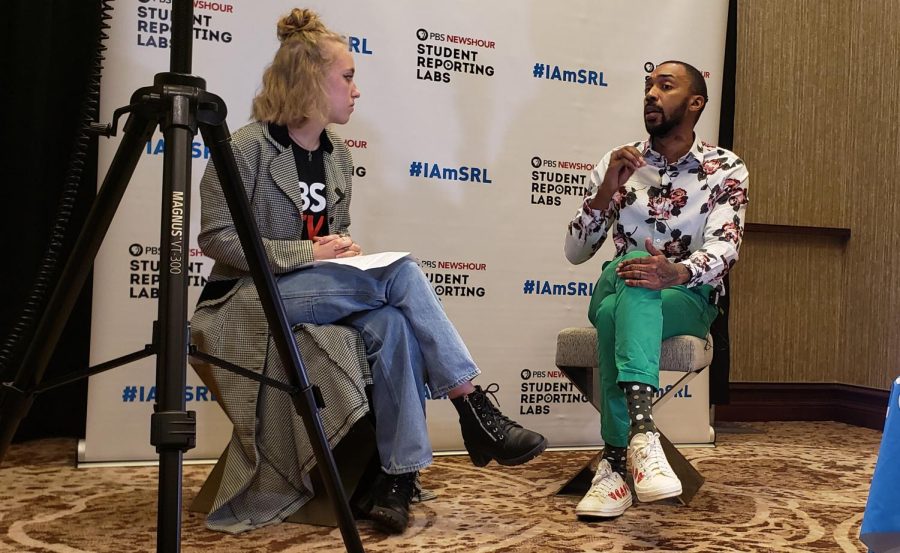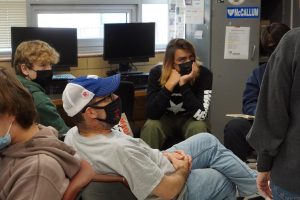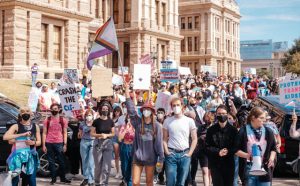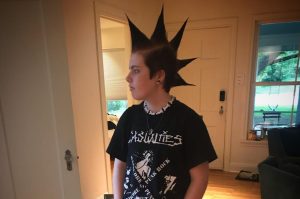‘All Boys Aren’t Blue’ author explains why their story about growing up Black, queer had to be told
PBS NewsHour Student Reporting Labs publishes our exclusive SXSW EDU interview with George M. Johnson
Representing the PBS NewsHour Student Reporting Labs, junior Emma Hagood interviews George M. Johnson, the award-winning author of the bestselling young adult memoir “All Boys Aren’t Blue” at SXSW EDU on March 8. “I really appreciated the opportunity to interview Johnson,” Hagood said. “They have a very meaningful reflection on what it means to Black and queer and the intersectionality of their identities, and I feel like I Iearned a lot from hearing their perspective.”
PBS NewsHour Student Reporting Labs
July 19, 2022
In an exclusive interview made possible by MacJournalism’s partnership with PBS NewsHour Student Reporting Labs, author George M. Johnson discusses their memoir, All Boys Aren’t Blue: A Memoir-Manifesto, and why it was so important to tell their story.
Johnson begins the interview with Emma Hagood by describing All Boys Aren’t Blue as a depiction of a quest to find themself.
“The book talks about my journey through identity—gender, sexuality but also my journey through Blackness—and fully coming to terms with the totality of my being being the intersections of those two things—Blackness and queerness—and how I can’t just show up in any room as one or the other,” Johnson said.
Johnson said that the hardest parts of the memoir to write were the same sections that are attracting the most attacks from critics of the book.
“There is no place for anyone who identifies as male to say, ‘I have been harmed, I have been abused,'” Johnson said.
But writing about his experience was essential, Johnson said, even though to do so meant being vulnerable to criticism and even censorship. Despite critical acclaim, All Boys Aren’t Blue has been banned from school libraries in at least eight states including some in Texas.
Johnson said the book’s message is aimed at two primary readers: first, a person who can see themself in Johnson’s experience and connect with it as “a possibility model,” and people who exist in the same space but don’t fully understand what their experience is like.
Johnson hopes that the latter audience comes to understand that they must approach all children from a place of love.
“Your child is naturally going to gravitate to what is innate to them,” Johnson said. “That’s what you are supposed to nurture.”
Hagood interviewed Johnson on the afternoon of March 8 as part of the PBS NewsHour Student Reporting Labs coverage of the SXSW EDU 2022 conference.
“I really appreciated the opportunity to interview Johnson,” Hagood said. “They have a very meaningful reflection on what it means to Black and queer and the intersectionality of their identities, and I feel like I learned a lot from hearing their perspective.”
The recipient of the 2019 Salute to Excellence Award by the National Association of Black Journalists and named in 2020 to The Root 100 Most Influential African Americans, Johnson published the All Boys Aren’t Blue in 2020 and a follow-up young-adult memoir We Are Not Broken in September of last year.
The interview was part of SRL’s initiative to have student reporters interview keynote speakers at SXSW EDU. Sophomore Alice Scott and senior Jose Martinez-McIntosh each operated one of the three cameras used for the interview.







